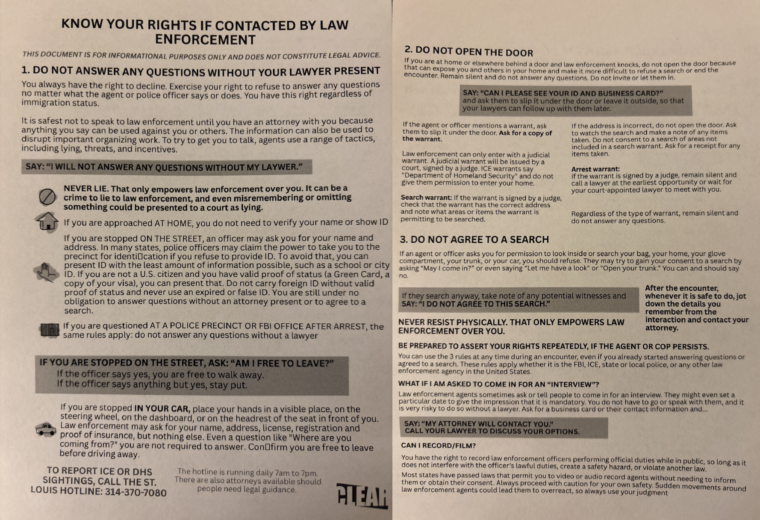News
Emergency Town Hall addresses student deportation concerns
After a flyer from Patriot Front — a white nationalist group — calling to “deport invaders” and “keep America American” was recently found in Graham Chapel, several of WashU’s affinity groups organized an emergency town hall to address white supremacy in Tisch Commons at 6 p.m. on April 8.
“[Patriot Front] refers to Americans [exclusively] as those descended from pan-European race, descended from pan-European … explorers,” said senior and Vice President of the Association of Black Students (ABS) Paul Scott. “That wouldn’t include me … nor any representatives of our other student organizations.”
The statements made by the flyer come at a time of nationwide immigration crackdowns, with dozens of university students and faculty in U.S. Immigration and Customs Enforcement (ICE) custody and over 600 student visas revoked as of April 10. These legal actions appear to target those part of the pro-Palestine movement, which according to reports has significant backing from African American and Hispanic communities. While no detainments have been recorded at WashU, numerous ICE sightings have occurred on campus.

Flyer provided at town hall explains rights of non-citizens when contacted by law enforcement. (Courtesy of Hadia Khatri)
The town hall — organized by Association of Black Students (ABS), Asian Multicultural Council (AMC), Association of Latin American Students (ALAS), and Black Law Students Association (BLSA) — aimed to educate immigrants and non-citizens on their legal rights when approached by law enforcement. The organizers provided informational legal materials on what to do when approached by a police officer (pictured above) and hosted a Q&A with Gregory Magarian, the Thomas and Karole Green Professor of Law, and Professor of Law Sheldon Evans.
Evans’ role as the BLSA’s faculty advisor prompted him to speak at the event in hopes of helping students understand this issue from a legal perspective. Evans told attendees of the town hall to be very direct with law enforcement in the event they are approached by an officer.
“Say, ‘am I under arrest?’ If you’re not under arrest, they can’t seize your person. Ask to leave, if they say yes, then leave,” Evans said. “Don’t lie to them. Silence is your best option, and you can say, ‘I’m asserting my right to remain silent.’ That is your best way to resist since ICE wants to get information.”
An attendee asked if the Washington University Police Department (WUPD) could be involved in ICE operations on campus, to which Evans said there isn’t a clear answer.
“University police departments don’t have to take directives from ICE. But the caveat is, it also depends on the larger laws and policies of St. Louis,” he said. “But it’s ultimately WashU’s decision.”
Immigrants and non-citizens are some of the most vulnerable populations in legal contexts according to Magarian, particularly when it comes to First Amendment rights, like freedom of speech.
“The courts are extremely deferential to the government on matters of national security and immigration and naturalization,” Magarian said. “If you’ve got a case where the government is going after a non-citizen [and] the non-citizen says it’s a violation of my First Amendment rights, in current circumstances I would not place any bets on the non-citizen winning.”
Further, immigrants and non-citizens do not get a government-appointed attorney in deportation court hearings — an area where the University could theoretically step in.
“If this were a priority of the university, protecting the interests of their students, I don’t think it’s unreasonable to ask the University to provide legal counsel,” Evans said.
While the University has not mentioned providing legal counsel to non-citizen students, it has outlined other steps to support them. In an email sent on April 9 to students, faculty, and staff, Executive Vice Chancellor of Academic Affairs Beverly Wendland acknowledged ongoing concerns.
“We see you and recognize that this is a stressful situation on many levels. We are here to support you and make sure you have resources to manage the current uncertainty, as well as any challenges that may come your way,” Wendland wrote.
One such resource is a webinar series hosted by the Office of International Students & Scholars. The series will cover travel details for international students and how to maintain a legal presence in the United States.
To Evans, a University-wide discussion regarding ongoing threats to non-citizens on campus is vital to maintain and bolster the WashU community at this time.
“I hope that students, professors, and the University administration can have productive dialogue on these issues that results in an outcome that preserves the values of our community,” he said. “Students should feel safe on campus, free speech should be valued, and ultimately we should foster an environment where we can learn from each other.”
